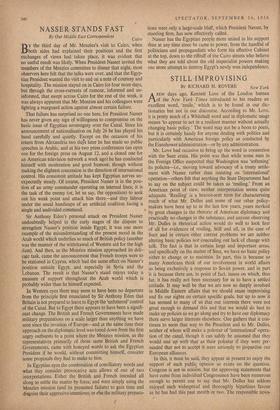NASSER STANDS FAST
By Our Middle East Correspondent Cairo BY the third day of Mr. Menzies's visit to Cairo, when both sides had explained their positions and the first exchanges of views had taken place, it was evident that no useful result was likely. When President Nasser invited the members of the Menzies committee to dinner that night, most observers here felt that the talks were over, and that the Egyp- tian President wanted the visit to end on a note of courtesy and hospitality. The mission stayed on in Cairo for four more days, but through the cross-currents of rumour, informed and un- informed, that swept across Cairo for the rest of the week, it was always apparent that Mr. Menzies and his colleagues were fighting a rearguard action against almost certain failure.
That failure has surprised no one here, for President Nasser has never given any sign of willingness to compromise on the basic issue of Egyptian sovereignty over the Canal. Since his announcement of nationalisation on July 26 he has played his hand carefully and quietly. Except on the occasion of his return from Alexandria two days later he has made no public speeches in Arabic, and at his two press conferences (an open one for the foreign press on August 12, and a closed one for an American television network a week ago) he has conducted himself with moderation and good humour, though without making the slightest concession in the direction of international control. His consistent attitude has kept Egyptian nerves un- expectedly steady. Of course, President Nasser is in the posi- tion of an army commander operating on internal lines; it is the task of the enemy (or, let us say, the opposition) to seek out his weak point and attack him there—and they labour under the usual handicaps of an artificial coalition facing a single and undivided command.
Sir Anthony Eden's personal attack on President Nasser undoubtedly helped in the early stages of the dispute to strengthen Nasser's position inside Egypt; it was one more example of the misunderstanding of the present mood in the Arab world which underlies so much of British policy (another was the manner of the withdrawal of Western aid for the high dam). And then, as the Menzies mission approached its deli-, cafe task, came the announcement that French troops were to be stationed in Cyprus, which had the same effect on Nasser's position outside Egypt, and especially in Syria and the Lebanon. The result is that Nasser's stand enjoys today a measure of support throughout the Arab world which is probably wider than he himself expected.
In Western eyes there may seem to have been no departure from the principle first enunciated by Sir Anthony Eden that Britain is not prepared to leave to Egypt the 'unfettered' control of the Canal. But to Egypt there appears to have been a signifi- cant change. The British and French Governments have made military preparations on a scale larger than anything we have seen since the invasion of Europe—and at the same time their approach on the diplomatic level was toned down from the first angry outbursts to a point where the Menzies mission, as the representatives primarily of those same British and French Governments, came with honeyed words to ask the Egyptian President if he would, without committing himself, consider some proposals they had to make to him.
In Egyptian eyes the combination of conciliatory words and what they consider provocative acts allows of one of two interpretations. Either the British and French intended all along to settle the matter by force, and were simply using the Menzies mission (and its presumed failure) to gain time and disguise their aggressive intentions; or else the military prepara- tions were only a large-scale bluff, which President Nasser, by standing firm, has now effectively called.
Nasser has the Egyptian people more united in his support than at any time since he came to power, from the handful of politicians and propagandists who form his effective Cabinet at the top, down to the riffraff of the Cairo streets who believe what they are told about the old imperialist powers making one more attempt to destroy Egypt's newly won independence.


































 Previous page
Previous page